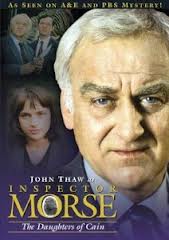
THE DAUGHTERS OF CAIN
UK, 1996, 105 minutes, Colour.
John Thaw, Kevin Whately, Phyllis Logan.
Directed by Herbert Wise.
The Daughters of Cain is an Inspector Morse story, made after the series came to an end. But the popularity of John Thaw as Morse and Kevin Whately as Lewis meant that other telemovies were made from Colin Dexter's novels. The film was directed by veteran Herbert Wise (director of many British telemovies and such series as Rumpole).
The murders take place in Oxford, which is attractively photographed. There is a mixture of the world of the university as well as the more ordinary life of Oxford. The usual characters are present, especially James Grout as the head. However, the screenplay is full of mid-'90s economic rationalism, downsizing as well as mobile phones and Internet.
Phyllis Logan (Secrets and Lies, Another Time, Another Place) is effective as the schoolteacher who murders the boorish husband of her friend.
The film has all the intricacies of the mysteries of the Morse series as well as the development of the characters, especially of Morse and Lewis themselves.
1. The popularity of the long-running series? Television movies? With style? The popularity of Morse and his personality, enigmatic and mannered style? The personality of Lewis? Their relationship? The solving of the crimes? Intricacy of the plot? The psychological dimensions, the mystery and clues? Police work and solving the mysteries with their own abilities? The work of Colin Dexter?
2. The Oxford settings, the city and landscapes, the cityscapes, the buildings? Comments about Oxford and Oxford society? The ironies about Oxford and the dons? The university city? Ordinary people? Their interconnections? So much beauty – and so much crime?
3. The quality of the mysteries, character-driven? Sufficient information, sufficient clues? The exploration of character and clues?
4. John Thaw as Morse, his personality, the changes over the years, yet remaining the same? The mystery of his name? His crusty manner, the bachelor (but romantic at times)? His own authority – exercised over Lewis – and his reaction to authorities? Promotion or not? The changing of his attitudes towards Lewis, bossing him, patronising him about education and culture? The issue of music? Drinking ale? His car? Quietly at home, at work? With Lewis, understanding the situations and characters, the deductions? His being a good listener – but critical?
5. The contrast with Lewis, the family man, the ordinary policeman, education and lack of education, his being put down by Morse – but enjoying his comeuppance now and again? Music and his ignorance? The first reactions, Lewis being patient? His admiration for Morse, having to do so much leg work, to formulate hypotheses? Working under pressure? Collaborator and partner of Morse?
6. The police authorities in Oxford? The medical examiners – and Morse and his attitude towards the female authorities? Sexist and patronising? Changing?
7. The quality of the film as a crime thriller, a thriller with intelligence and demands on the audience?
8. The introduction to the crime, the credits, the background in Oxford, beyond?
9. The range of personalities, motives? Truth and concealment? Jealousies? Deceits and angers? The academic and religious backgrounds?